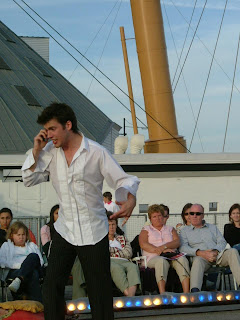 (Thursday -- Sarah apologizes to everyone for not responding to your posts, but an electrical storm fried her modem yesterday and has caused her no end of headaches. She promises to respond as soon as she has the new modem installed -- Amanda)
(Thursday -- Sarah apologizes to everyone for not responding to your posts, but an electrical storm fried her modem yesterday and has caused her no end of headaches. She promises to respond as soon as she has the new modem installed -- Amanda)Listen, she said. This is urgent. If there is one thing you must remember, when writing a book, it’s the voice. It can make the whole thing hang together or not. The best story with an hesitant, meandering voice – a voice afraid of itself – will come across unremarkable. The oldest, most hackneyed story, blared forth in a strong voice, will make people sit up and pay attention. Lots of attention.
So, what’s the difference? Yeah, yeah, I know I’ve covered this before. But it’s my current obsession.
I confess I’d never even thought of voice as something one must have. You have to understand, I grew up reading... everything. We didn’t have a tv till I was eight, and then the tv we had had about four hours unremarkable daily programming. I used to try to catch the noon program, which was often Merry Melodies. And on Saturdays there were Westerns. But the rest of the time, really – dance competition, singing program, news, boring lecture – the books were far more attractive.
You didn’t need much of a hook to grab me. Not putting me off was enough. I read fiction. Mystery, Science Fiction, Fantasy and, in despair, my cousin Natalia’s "blue collection" (not what you think, dears. Blue because the covers were blue) of truly trashy romance books. (I’m probably doing this line an injustice, but the plot that seemed to be most common was girl meets matador, girl falls in love with matador. He falls in love with her. Intrigues or whatever intervene. She realizes he loves her and JUST before they reconcile, he dies. She mourns him forever. Happy ending Portuguese style.) If truly, truly out of other stuff, I read school books. Mine, my brothers’, my cousins’, my parents’ from when they were younger. For instance, I first fell in love with history reading my mother’s old school book. And if all else failed, I read want adds. Truly, no voice needed. Being on paper and printed was enough.
Then I grew up, got married, had kids. My time became very limited. I don’t remember when I began to realize about half the books I started ended up somewhere, face down, forgotten, not missed. The books needed to have something special to hold me.
I still didn’t think of it as voice. And sometimes it wasn’t. It’s very easy, for instance, for mysteries to lose me when the plot makes no sense.
As a writer, my first fear was language. This is because English is my third language. I spent my first ten years of writing in fear that all the editors were laughing at my wish to be published in English. When I let go of that – thanks to Dean Wesley Smith who told me I had worked the language enough, pick something else. Only more politely – I turned to plot, because I knew I was weak there. Characters – those seem to come naturally and without much thought. I worked plot like crazy. And pacing. Because in addition to odd ideas of "happy endings" Portuguese story-telling rhythms are naturally slower. I didn’t want to tell Portuguese stories. It’s not what I read.
It wasn’t until Constellation a few years ago, when I was listening to Dave Weber that I realized the importance of voice. Dave pointed out you can make all sorts of mistakes, provided you have a strong and confident voice. I realized this was true. Look, for instance, at the opening of most Heinleins. He tells the story so confidently, you never doubt he SAW it, and it is happening or happened. Which is the first part of giving a d*mn about it, of course. And a lot of the people I mentor are GOOD writers. But their voice hesitates, meanders. They don’t speak from authority. They let you see that they’re lying.
Since then I have been very conscious of voice. To an extent, I always was, in that until I HEAR the story in my head I can’t write it. But now I also get tied up in knots. "Is this a good voice? A voice of authority?"
The truth is I don’t know. Sometimes you can feel it, like an almost electrical charge. Most of the time you don’t know till someone else reads it. Or till you come back months later. Which is not always possible.
I bought a book on voice, but it is lame. The author’s idea seems to be that if you eliminate all conjunction, all buts and ands, you have voice. I defy anyone to find fault in authors with a more flowery/convoluted use of language, including Bradbury and on occasion Pterry. No, they have voice. This guy doesn’t know what he’s talking about.
So, am I chasing a chimera? Is there such a thing as voice? And if there is, is it worth pursuing through the labyrinths of story telling? Or am I like those whom the (storytelling) gods love?
And in case you all have forgotten, Dave is still telling a great story over at:
http://savethedragons.nu/





























